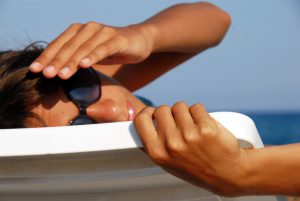 Rosacea risk is linked to genes, obesity, heart disease and sun exposure. The study suggested that environmental factors and genetics play a 50/50 role in the risk of rosacea, a chronic skin disorder. Lead author Dr. Daniel Popkin said, “Fifty-fifty is not a complete surprise in retrospect, but we just didn’t know. We now have strong evidence for the first time that there is clearly a genetic contribution.”
Rosacea risk is linked to genes, obesity, heart disease and sun exposure. The study suggested that environmental factors and genetics play a 50/50 role in the risk of rosacea, a chronic skin disorder. Lead author Dr. Daniel Popkin said, “Fifty-fifty is not a complete surprise in retrospect, but we just didn’t know. We now have strong evidence for the first time that there is clearly a genetic contribution.”
If a person has a strong family history of rosacea “more attention should be paid to environmental factors, and seeking medical advice can help quite a bit. Lifestyle choices can definitely attenuate [reduce the severity of the] disease,” Dr. Popkin said.
Advertisement
An estimated 16 million Americans live with rosacea.
Rosacea causes reddening of the skin, particularly the face, along with bumps, visible blood vessels, and watery eyes. If left untreated, it can impact one’s quality of life. In surveys of rosacea patients, nine out of 10 patients report self-confidence and self-esteem issues.
To understand the cause of rosacea, the researchers studied 275 pairs of twins who completed lifestyle and medical history surveys, and went for dermatological testing prior to getting their rosacea score.
The researchers concluded that genetics is responsible for a 46 percent risk of rosacea development. Risk for rosacea was greater with sun exposure, older age, higher body mass index, smoking, drinking, heart disease, and skin cancer.
Dr. Lawrence Eichenfield, chief of pediatric and adolescent dermatology at the University of California, San Diego, suggests that a person can still reduce their risk of rosacea. Eichenfield said, “You can’t change your genetics without changing who your parents were, but you can [avoid smoking] and not get too much sun.”
“If you have signs of rosacea, or think you might, such as having a family history, get educated about it and consider moderating UV exposure, alcohol, and foods that might cause flushing,” Eichenfield concluded.
Rosacea flare-ups triggering factors
Advertisement
Rosacea patients can reduce their risk of flare-ups by identifying their triggering factors. By avoiding or limiting these triggers, patients may find greater success in rosacea management and notice a reduction in flare-ups.
Here is a list of common triggering factors to consider with regards to better management of rosacea.
- Sun exposure
- Emotional stress
- Hot weather
- Wind
- Heavy exercise
- Alcohol consumption
- Hot baths
- Cold water
- Spicy food
- Humidity
- Indoor heat
- Certain skincare products
- Heated beverages
- Certain cosmetics
- Medications
- Medical conditions
- Certain fruits
- Marinated meat
- Certain vegetables
- Milk products
Everyone is different, so not all of these factors may apply to you. To help narrow down on your own triggering factors, keep a rosacea journal handy. When a flare occurs, document what you were doing or what you were eating when it happened to help detect your specific triggers.
